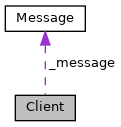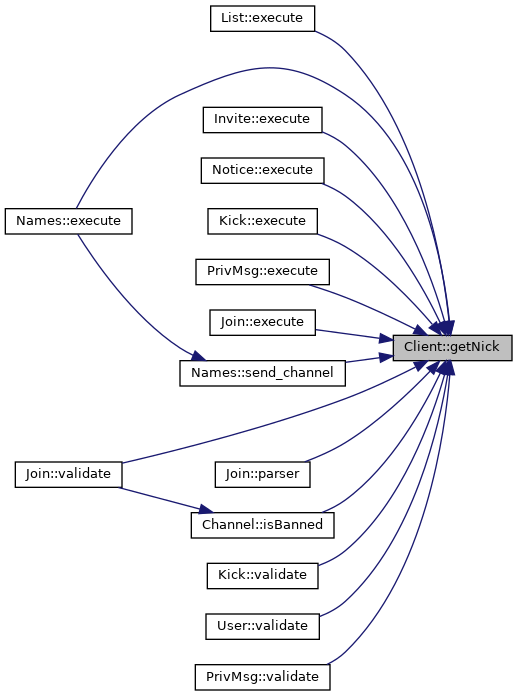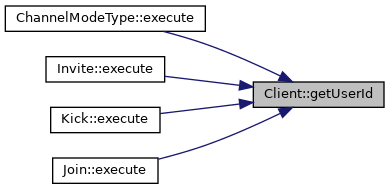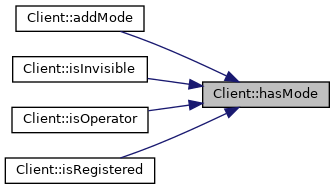#include <Client.hpp>
◆ Client()
| Client::Client |
( |
int & |
fd, |
|
|
std::string |
host, |
|
|
std::string |
servername, |
|
|
std::string |
version |
|
) |
| |
|
inline |
◆ ~Client()
◆ addMode()
◆ authenticate()
| void Client::authenticate |
( |
void |
| ) |
|
|
inline |
◆ ban()
| void Client::ban |
( |
void |
| ) |
|
|
inline |
◆ canPerformPassCommand()
| bool Client::canPerformPassCommand |
( |
void |
| ) |
const |
|
inline |
◆ disconnect()
| void Client::disconnect |
( |
void |
| ) |
|
|
inline |
◆ getHost()
| const std::string Client::getHost |
( |
void |
| ) |
const |
|
inline |
◆ getNick()
| const std::string Client::getNick |
( |
void |
| ) |
const |
|
inline |
◆ getRealname()
| const std::string Client::getRealname |
( |
void |
| ) |
const |
|
inline |
◆ getServername()
| const std::string Client::getServername |
( |
void |
| ) |
const |
|
inline |
◆ getSupportString()
| std::string Client::getSupportString |
( |
void |
| ) |
|
|
inline |
◆ getUserId()
| const std::string Client::getUserId |
( |
void |
| ) |
const |
|
inline |
◆ getUsername()
| const std::string Client::getUsername |
( |
void |
| ) |
const |
|
inline |
◆ hasMode()
◆ isAuthenticated()
| bool Client::isAuthenticated |
( |
void |
| ) |
const |
|
inline |
◆ isInvisible()
| bool Client::isInvisible |
( |
void |
| ) |
|
|
inline |
◆ isOperator()
| bool Client::isOperator |
( |
void |
| ) |
|
|
inline |
◆ isRegistered()
| bool Client::isRegistered |
( |
void |
| ) |
|
|
inline |
◆ loginFail()
| void Client::loginFail |
( |
void |
| ) |
|
|
inline |
◆ message() [1/2]
| void Client::message |
( |
char const * |
message | ) |
|
◆ message() [2/2]
| void Client::message |
( |
std::string const |
message | ) |
|
◆ messagesReceived()
| std::vector<Message> Client::messagesReceived |
( |
| ) |
const |
|
inline |
◆ messagesSent()
| std::vector<Message> Client::messagesSent |
( |
| ) |
const |
|
inline |
◆ read()
| void Client::read |
( |
void |
| ) |
|
◆ readConfigFile()
| std::vector<std::string> Client::readConfigFile |
( |
char const * |
filename | ) |
|
|
inline |
◆ setNick()
| void Client::setNick |
( |
std::string const & |
nick | ) |
|
|
inline |
◆ setRealName()
| void Client::setRealName |
( |
std::string const & |
realname | ) |
|
|
inline |
◆ setUsername()
| void Client::setUsername |
( |
std::string const & |
username | ) |
|
|
inline |
◆ _attempts
◆ _fd
◆ _host
| std::string Client::_host |
◆ _is_authenticated
| bool Client::_is_authenticated |
◆ _is_ope
◆ _is_passLogged
| bool Client::_is_passLogged |
◆ _maxChannels
| const int Client::_maxChannels |
◆ _message
◆ _messagesReceived
| std::vector<Message> Client::_messagesReceived |
◆ _messagesSent
| std::vector<Message> Client::_messagesSent |
◆ _modes
◆ _nick
| std::string Client::_nick |
◆ _realname
| std::string Client::_realname |
◆ _servername
| std::string Client::_servername |
◆ _serverversion
| std::string Client::_serverversion |
◆ _status
◆ _username
| std::string Client::_username |
The documentation for this class was generated from the following files:


























